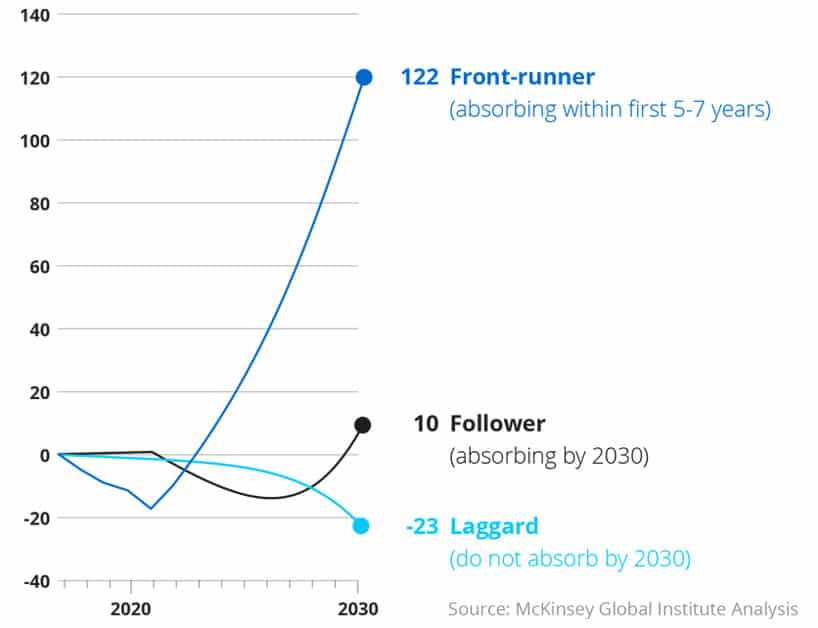Distributors are trying to understand how to gain an edge through artificial intelligence (AI). While AI may seem daunting, the key is to start small and start now.
Early AI adopters are already realizing massive advantages over competitors hesitant to embrace this transformative technology.
The Early AI Adopter Advantage
A McKinsey study revealed early AI adopters could increase cash flow by a staggering 122%. Those following the leaders may only see a 10% increase, while late adopters face potential cash flow losses of up to 23%. These numbers underscore the urgency for distributors to start AI strategies now to secure a competitive edge.
Relative changes in cash flow by AI-adoption cohort (cumulative % change per cohort)

Start Small, Start Now
Embracing AI doesn’t require enterprise-wide overhauls from day one. An incremental approach to AI through targeted pilot projects allows companies to realize value with minimal risk. This low-stakes testing demystifies the technology and builds organizational AI capabilities a little bit at a time.
A Practical Roadmap for AI
- Prioritize High-Impact Areas: Target processes where AI can drive immediate impact like sales, customer service or logistics.
- Seek AI Partnerships: Collaborate with AI solution providers to deploy advanced capabilities without heavy in-house development.
- Invest in Upskilling: Implement training initiatives to equip employees with AI literacy and the tools to work with new AI systems.
Related: How Distributors Can Build Their AI Roadmap
The Incremental Advantage
By taking an incremental approach, distributors control risks while progressively developing AI capabilities and strategies. Each initiative provides critical learnings to refine subsequent AI rollouts across the organization.
The Choice
Distributors face a choice – be an AI leader or quickly fall behind.
The time is now to initiate AI adoption, even if starting small. AI is not just a tool for improvement — it is a critical part of future-proofing your operations and achieving market leadership. The transformative potential of AI in distribution is inevitable. It stands as an external force in shaping the future of our industry. Companies that embrace AI technologies today are setting the groundwork for tomorrow’s success, gaining a competitive edge that will differentiate them.
The evidence is clear: Harnessing the power of AI, you can redefine efficiency, enhance customer satisfaction and lead your company into a new era of profitability and market leadership.
If you want to succeed with AI, you need a roadmap. Applied AI for Distributors will give you the insights and tools you’ll need to craft it. The conference offers a unique opportunity to explore cutting-edge AI applications and networking events, ensuring you can directly apply AI and stay ahead of your competition.
As Chief Operations Officer of a Distribution Strategy Group, I'm in the unique position of having helped transform distribution companies and am now collaborating with AI vendors to understand their solutions. My background in industrial distribution operations, sales process management, and continuous improvement provides a different perspective on how distributors can leverage AI to transform margin and productivity challenges into competitive advantages.

